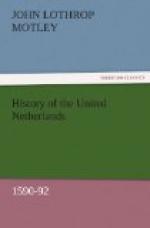But Mayenne, in this grovelling career of self-seeking, in this perpetual loading of dice and marking of cards, which formed the main occupation of so many kings and princes of the period, and which passed for Machiavellian politics, was a fair match for the Spanish king and his Italian viceroy. He sent President Jeannin on special mission to Philip, asking for two armies, one to be under his command, the other under that of Farnese, and assured him that he should be king himself, or appoint any man he liked to the vacant throne. Thus he had secured one hundred thousand crowns a month to carry on his own game withal. “The maintenance of these two armies costs me 261,000 crowns a month,” said Philip to his envoy Ybarra.
And what was the result of all this expenditure of money, of all this lying and counter-lying, of all this frantic effort on the part of the most powerful monarch of the age to obtain property which did not belong to him—the sovereignty of a great kingdom, stocked with a dozen millions of human beings—of all this endless bloodshed of the people in the interests of a high-born family or two, of all this infamous brokerage charged by great nobles for their attempts to transfer kingdoms like private farms from one owner to another? Time was to show. Meanwhile men trembled at the name of Philip II., and grovelled before him as the incarnation of sagacity, high policy, and king-craft.
But Mayenne, while taking the brokerage, was less anxious about the transfer. He had fine instinct enough to suspect that the Bearnese, outcast though he seemed, might after all not be playing so desperate a game against the League as it was the fashion to suppose. He knew whether or not Henry was likely to prove a more fanatical Huguenot in 1592 than he bad shown himself twenty years before at the Bartholomew festival. And he had wit enough to foresee that the “instruction” which the gay free-thinker held so cautiously in his fingers might perhaps turn out the trump card. A bold, valorous Frenchman with a flawless title, and washed whiter than snow by the freshet of holy water, might prove a more formidable claimant to the allegiance of Frenchmen than a foreign potentate, even though backed by all the doctors of the Sorbonne.
The murder of President Brisson and his colleagues by the confederates of the sixteen quarters, was in truth the beginning of the end. What seemed a proof of supreme power was the precursor of a counter-revolution, destined ere long to lead farther than men dreamed. The Sixteen believed themselves omnipotent. Mayenne being in their power, it was for them to bestow the crown at their will, or to hold it suspended in air as long as seemed best to them. They felt no doubt that all the other great cities in the kingdom would follow the example of Paris.




